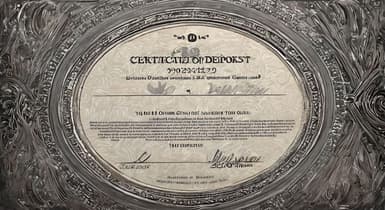Are Certificates of Deposit (CDs) Taxable? All You Need to Know

In the US, there are many programs that allow you to save money. They include basic deposits in banks and various commercial structures that guarantee the preservation of the user's finances for a specified (contracted) time. However, isn't it better to let your money work? You can invest your savings in CDs (Certificates of Deposit) and receive profits in the form of interest on the investment amount.
But passive income is still income, so it is taxable. Learn more about what to expect when investing in CDs and get answers to the following questions:
- Are certificates of deposit taxable?
- Do you have to pay taxes on CDs?
- How are CDs taxed?
- Can the amount of taxes be reduced?
- How do you get rid of the commission or postpone it?
Today, we will discuss the key features of tax on CD interest, deposits, and ways to save on interest payments.
About Certificates of Deposit (CDs) and Their Varieties

Certificates of Deposit are an opportunity to save finances and make a profit from them. Depending on the form of CD, the owner can count on a bond with different rates and terms of deposits. However, according to the IRA rules, you have to submit a declaration each year indicating your income from these investment programs.
There are quite a few types of CDs:
- Traditional;
- Bump-up;
- Step-up;
- Liquid (or no-penalty);
- Zero-coupon;
- Callable;
- Brokered;
- High-yield;
- Jumbo;
- IRA;
- Add-on;
- Foreign currency.
Of course, they all contain tax on CD interest, but the investment conditions differ. For example, the cash storage term is specified in some investment programs, and the user cannot withdraw funds until this date. In the case of withdrawal, the user must pay fines.
Let's check what CDs are taxable and look at the taxation of investment income.
Do You Pay Taxes on CDs?: Basic Principles

The answer to the question, "Is CD interest taxable?” is unequivocal: YES. Even when you file your annual tax return, you must fill out a 1099-INT form you receive from your bank or report directly to the IRS. This income is usually reported on line 2b of Form 1040.
The percentage of tax charged on profits is dynamic and depends on the policies and rates of each state. The maximum tax is up to 37% of the amount for the upper tax group. Therefore, to determine the fees you have to pay, consult with your bank manager or a Rates representative.
The tax is calculated exclusively on the profit. For example, if you invested an amount of $20,000 for 2 years, while the institution returns you a conditional $21,000, the tax is calculated only for the difference, that is, $1,000.
Moreover, if you have a long-term deposit, you must declare income from it every year by the end of the current tax period (the date changes dynamically). For instance, if you receive a conditional $200 per year, you will pay tax on this amount each time. However, the most interesting is yet to come.
Benefits and Penalties for Investing in CDs

When you invest in a profitable deposit, you enter into a contract with a financial institution for a certain period. It can be completely different, for example:
- Short-term. Up to 1 year from the moment of signing the contract.
- Medium term. Up to 3–5 years or another term specified in the contract.
- Long-term. From 3–5 years, with a maximum term established by the institution.
At the same time, you can choose the type of contract:
- With cash withdrawal. You can partially withdraw the amount during the storage period. However, you receive smaller profits or lose them.
- No cash withdrawal. You must keep the funds for the entire term and do not have the right to withdraw them. In case of violation of the agreement, a fine is imposed on you. However, if you follow the rules, you get higher annual or monthly interest.
The first option is more convenient if you are not sure of your financial stability. However, the second one is economically more profitable because you receive higher interest and earn more. At the same time, income taxes also grow, and you should consider it. Or at least know how they can be reduced or compensated.
Ways to Reduce Taxes on CD Investments

There are basically two life hacks for how to avoid tax on CD interest:
- You can save funds and profits from them in specialized pension funds accounts like a 401(k). In this case, you do not pay tax until you start using the funds from it. However, there are limitations to this method. For example, your annual contribution should not exceed the established limits (different amounts for different ages). Also, you should not withdraw funds in advance. Otherwise, you will have to pay tax both on the entire amount and on the interest income from the investment.
- You can offset part of the tax from the fine in case of distribution funds. For example, if you terminate the agreement early, you will be subject to a conditional penalty of $50 from the financial institution. At the same time, you still have a certain profit from the amount of the deposit. That is, you are obliged to pay tax. So, you can include a fine in the invoice and use it to pay off a part of your taxes.
These are the ways that allow you to avoid paying taxes legally. If you are recommended any "schemes" of evasion, it is better to avoid them if you do not want to get in trouble with the law.
Conclusion
So, are CDs taxed? Of course. However, these are not amounts you will want to avoid. Moreover, you can postpone the payment of taxes for quite a long time, which can save you in the short term. Among such opportunities, we recommend using the inclusion of earnings in a special fund (for example, 401(k)). You will save for a decent vacation and reduce your expenses now.




